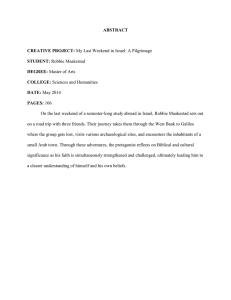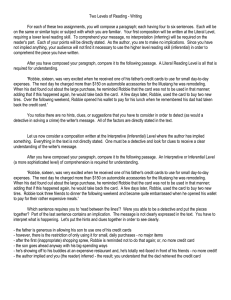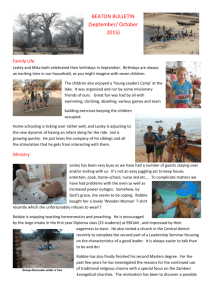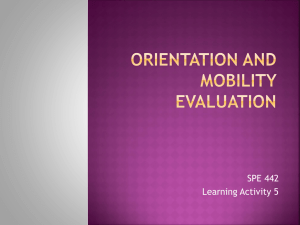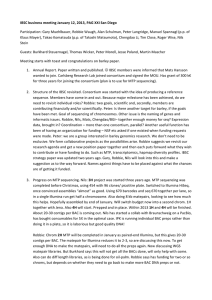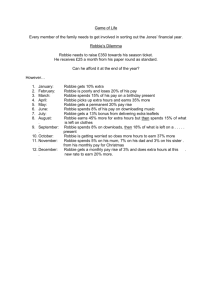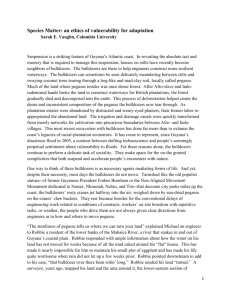Major R Calder BEM - Regimental Headquarters Royal Military Police
advertisement
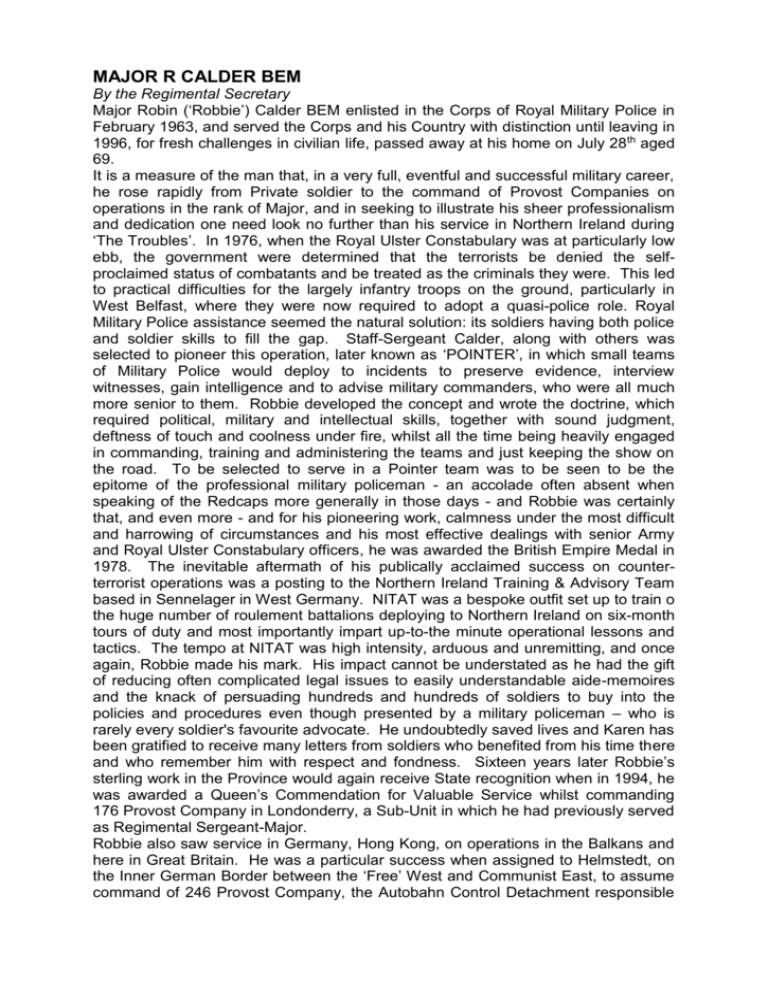
MAJOR R CALDER BEM By the Regimental Secretary Major Robin (‘Robbie’) Calder BEM enlisted in the Corps of Royal Military Police in February 1963, and served the Corps and his Country with distinction until leaving in 1996, for fresh challenges in civilian life, passed away at his home on July 28 th aged 69. It is a measure of the man that, in a very full, eventful and successful military career, he rose rapidly from Private soldier to the command of Provost Companies on operations in the rank of Major, and in seeking to illustrate his sheer professionalism and dedication one need look no further than his service in Northern Ireland during ‘The Troubles’. In 1976, when the Royal Ulster Constabulary was at particularly low ebb, the government were determined that the terrorists be denied the selfproclaimed status of combatants and be treated as the criminals they were. This led to practical difficulties for the largely infantry troops on the ground, particularly in West Belfast, where they were now required to adopt a quasi-police role. Royal Military Police assistance seemed the natural solution: its soldiers having both police and soldier skills to fill the gap. Staff-Sergeant Calder, along with others was selected to pioneer this operation, later known as ‘POINTER’, in which small teams of Military Police would deploy to incidents to preserve evidence, interview witnesses, gain intelligence and to advise military commanders, who were all much more senior to them. Robbie developed the concept and wrote the doctrine, which required political, military and intellectual skills, together with sound judgment, deftness of touch and coolness under fire, whilst all the time being heavily engaged in commanding, training and administering the teams and just keeping the show on the road. To be selected to serve in a Pointer team was to be seen to be the epitome of the professional military policeman - an accolade often absent when speaking of the Redcaps more generally in those days - and Robbie was certainly that, and even more - and for his pioneering work, calmness under the most difficult and harrowing of circumstances and his most effective dealings with senior Army and Royal Ulster Constabulary officers, he was awarded the British Empire Medal in 1978. The inevitable aftermath of his publically acclaimed success on counterterrorist operations was a posting to the Northern Ireland Training & Advisory Team based in Sennelager in West Germany. NITAT was a bespoke outfit set up to train o the huge number of roulement battalions deploying to Northern Ireland on six-month tours of duty and most importantly impart up-to-the minute operational lessons and tactics. The tempo at NITAT was high intensity, arduous and unremitting, and once again, Robbie made his mark. His impact cannot be understated as he had the gift of reducing often complicated legal issues to easily understandable aide-memoires and the knack of persuading hundreds and hundreds of soldiers to buy into the policies and procedures even though presented by a military policeman – who is rarely every soldier's favourite advocate. He undoubtedly saved lives and Karen has been gratified to receive many letters from soldiers who benefited from his time there and who remember him with respect and fondness. Sixteen years later Robbie’s sterling work in the Province would again receive State recognition when in 1994, he was awarded a Queen’s Commendation for Valuable Service whilst commanding 176 Provost Company in Londonderry, a Sub-Unit in which he had previously served as Regimental Sergeant-Major. Robbie also saw service in Germany, Hong Kong, on operations in the Balkans and here in Great Britain. He was a particular success when assigned to Helmstedt, on the Inner German Border between the ‘Free’ West and Communist East, to assume command of 246 Provost Company, the Autobahn Control Detachment responsible for access control to the only sanctioned road corridor running through East Germany to West Berlin. As Officer Commanding and de facto Allied Commandant at ‘Checkpoint Alpha’ he was responsible for liaison with our American and French allies as well as with the West German border guards and our own British Frontier Service and of course most importantly with the Russians. The Soviet military officers respected him greatly for his soldier-like demeanour, no-nonsense approach to any real or imagined problem and his patent professionalism while he served with Karen and their young family on what was then very much the fault-line of Europe. During the early days of the conflict in the former Yugoslavia, Robbie gave further proof of the intensity of his leadership and the degree to which he would go to support and protect his Non-Commissioned Officers in the most demanding and dangerous situations. He was especially proud that he led the Company in - and brought them all home. Intensely private, Robbie was a tough and powerful character - both physically and mentally - and particularly so when on the rugby field. He demanded much from his subordinates: never being one to suffer fools gladly. But those that knew him well also knew that he had a soft centre: caring passionately for his soldiers and their families, ever generous of his time to help those going through a particularly bad patch and striving to ensure the welfare and well-being of all his charges. It would be wrong to portray Robbie as without fault: he could be a challenge to any Commanding Officer, but only because, while he expected much from those he commanded, he expected even more from those who commanded him. I close by paraphrasing some words of United States General George S Patton spoken in 1945: 'It is foolish and wrong to mourn friends who have died. Rather we should thank God that such men lived.' All of our lives are much fuller and brighter as a result of our having shared our time with Robbie and I know that I for one will always think of him fondly and with a wry smile as I recall the things we got up to when we were all younger.
